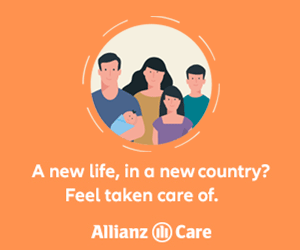What are emergency services like in China?
When we asked members about emergency services in China, they wrote...
"Emergency services in China are generally reliable and efficient. In the event of an emergency, the best way to call for an ambulance is to dial 120, which is the national emergency number. This number is toll-free and can be dialed from any phone, including landlines and mobile phones. Once the call is connected, the operator will ask for the caller's location and the nature of the emergency. The operator will then dispatch an ambulance to the location," mentioned another expat when asked about moving to China.
"In addition to a number of smaller local clinics., there are 2 BIG hospitals in Shenzhen. The main hospital is Peking University Hospital (Shenzhen), sometimes referred to as Beijing University Hospital by locals. The other is Hong Kong University Hospital (Shenzhen). Both are readily accessible by either bus or metro. Both are public. I have had extensive experience in both hospitals, so the following information is based on my personal experience. Peking University Hospital is older and services the masses. However, they have a VIP service area (6th floor) and will provide a medical interpreter. Although you will not find very many foreigners at this hospital, the staff overall is very helpful and professional. In fact, I felt extremely well-cared for and was treated with respect, but privacy and cleanliness can be an issue. For the most part, the Chinese have no concept of personal space or privacy, so if you don't have anyone with you to guard the door, people will literally barge into exam rooms as they are anxiously waiting their turn. However, knowing this in advance, you can establish boundaries and maintain a respectable degree of privacy. The medical staff and even patients will do their best to try and help you. In terms of hygiene standards, please bear in mind that this is China. As I stated, this hospital serves the masses, but they do their best to keep it clean, which still pales in comparison to any hospital or clinic you would find in USA. Again, the staff is extremely helpful and the quality of care was outstanding. Hong Kong University Hospital (Shenzhen), is very new, but still public. It is not as centrally located as the other hospital and therefore, is not as busy. Also, as it is new, it is much cleaner. HOWEVER, regardless of what you are told by local Chinese, VERY FEW GENERAL STAFF SPEAK ENGLISH. But they do have some English speaking doctors. The big issue is navigating the system to get to the doctors because I found many of the staff to be very impersonal. Remember Chinese are shy by nature and therefore, not very customer service oriented, so I found that the staff would just point, which is really not so helpful when you need specific information. I received medical care at both of these hospital. At Peking University Hospital (Shenzhen) I was treated for a stroke. Getting the diagnosis was quick because getting diagnostic tests done is extremely efficient. I chose NOT to be hospitalized and received out-patient treatment for 2 hours 3 times a week. Unfortunately, my treatment was NOT covered by my employer's private insurance plan. The costs were less than in USA, but still expensive by Chinese standards. Thankfully, I made a full recovery, no doubt in part to the excellent medical care. At Hong Kong University Hospital (Shenzhen), I received medical treatment for both a broken rib and to diagnosis and treat colorectal cancer. It was a major ordeal to get the proper diagnosis for my cancer, but getting the x-rays, CT scans, blood work, etc. was extremely efficient. In terms of the medical care that I received while I was there, I would say that it was adequate, but there were MAJOR language barriers and numerous miscommunications because the hospital does NOT have translators. Again, I had been told repeatedly that the staff speaks English, but I ASSURE YOU THEY SPEAK CHINGLISH NOT ENGLISH. Oftentimes, it was extremely frustrating because it was difficult if not impossible to understand what they were saying. Their pronunciation was quite poor, so even once they looked up the proper words, it was still hard to communicate. The hospital markets itself as a friendly English speaking hospital, but I PERSONALLY state that is NOT THE CASE. The head surgeon was assigned to my case and he was on staff only part-time as he lives in Hong Kong. I found the junior surgeon and staff to be arrogant, unfriendly, NOT shy. They were very unresponsive to many of my questions and I found myself having to repeat my questions. I had to insist on getting answers. Again, I understand that Chinese people don't typically ask questions to doctors (who apparently at this hospital have the mindset that they are Gods), but this is a medical care facility. As a patient, I expect to be able to ask questions, but I didn't feel that the staff were receptive. In fact, it was impossible to speak to the head-surgeon when I returned to the hospital for follow-up exam 2 months later. Instead I was referred to the junior surgeon who out right refused to get me in touch with the head surgeon who spoke better English. Furthermore, he was recommending further life altering surgery without even doing a proper follow-up physical exam. Communication became impossible, so I went to Peking University Hospital to get a 2nd opinion. At that hospital I was treated with dignity and given a medical translator. The specialist doctor there, recommended I go to Guangzhou to get more treatment options. If I had to rate the care of each of these hospitals, I would give Peking University Hospital an A- (cleanliness could be improved, but it is China) Hong Kong University Hospital would get a D because poor communication impacted the quality of my care. My diagnosis would have been made much earlier if the communication was better. Also, I never received the proper follow-up care," commented one expat who made the move to Shenzhen, China.
 Remitly
RemitlyLearn More
Send money online for what matters most. We make international money transfers easier than ever. Choose how and when you send, with great exchange rates and low fees.
 Remitly
RemitlySend money online for what matters most.
We make international money transfers easier than ever. Choose how and when you send, with great exchange rates and low fees.
Learn More
Other Questions:
- What do I need to know before retiring in China?
- How do I meet people in China?
- What is life like in China?
- Is there a lot of crime in China?
- Is there a lot of diversity? Are people in China accepting of differences?
- What are the schools in China like?
- Is the cost of living in China high?
- What advice do you have for expats having a baby in China?
- What are healthcare services like in China?
- Is the cost of living in China high?
- What type of recreational facilities are in China?
- What is the weather like in China?
- Are there good restaurants in China?
- Where will I buy groceries and do other shopping in China?
- What are the visa & residency requirements in China?
- Are healthcare and health insurance expensive in China?
- What do I need to know when buying property in China?
- Are foreigners allowed to own property in China?
- What appliances are typically included in a rental?
What are emergency services like in China?
If you live in China, newcomers to China would love to hear your answer to this question:
About the Author
 Joshua Wood, LPC joined Expat Exchange in 2000 and serves as one of its Co-Presidents. He is also one of the Founders of Digital Nomad Exchange. Prior to Expat Exchange, Joshua worked for NBC Cable (MSNBC and CNBC
Primetime). Joshua has a BA from Syracuse and a Master's in Clinical and Counseling Psychology from Fairleigh Dickinson University. Mr. Wood is also a licensed counselor and psychotherapist.
Joshua Wood, LPC joined Expat Exchange in 2000 and serves as one of its Co-Presidents. He is also one of the Founders of Digital Nomad Exchange. Prior to Expat Exchange, Joshua worked for NBC Cable (MSNBC and CNBC
Primetime). Joshua has a BA from Syracuse and a Master's in Clinical and Counseling Psychology from Fairleigh Dickinson University. Mr. Wood is also a licensed counselor and psychotherapist.
Some of Joshua's articles include Pros and Cons of Living in Portugal, 10 Best Places to Live in Ireland and Pros and Cons of Living in Uruguay. Connect with Joshua on LinkedIn.

 China
China

